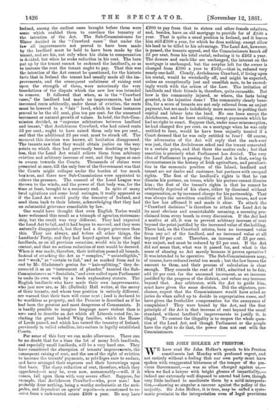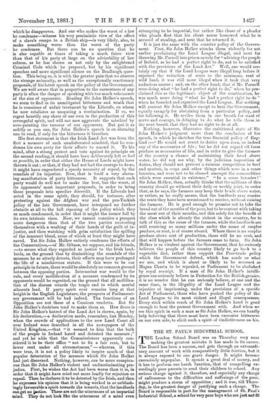SIR JOHN HOLKER AT PRESTON.
WE have read Sir John Holker's speech to his Preston constituents last Monday with profound regret, and not entirely without a feeling that our own party-must have spoken with exaggerated bitterness of the temper Of the pre- vious Government,—as was so often charged against us,— when we find a lawyer with bright gleams of impartiality,— indeed one extremely well disposed to amend bad laws, though very little inclined to ameliorate them by a raild,interpreta- tion,—showing so singular a rancour against (lie-policy of the majority. Sir John Holker, it is true, may be called a syste- matic pessimist in the interpretation even of -legal provisions
which he disapproves. And one who makes the worst of a law he condemns—witness his very pessimistic view of the effect of a slave's escape to a British ship—is very likely, also, to make something worse than the worst of the party he condemns. But there can be no question that he is also capable at times of taking a much fairer view than that of his party at large on the advisability of law reform, as he has shown us not only by the enlightened Criminal Code which • he prepared, but by his significant speeches and more significant silence on the Bradlaugh ques- tion. This being so, it is with the greater pain that we observe the strange animosity, as well as the exceptionally reactionary proposals, of his latest speech on the policy of the Government. We are well aware that in proportion to the earnestness of any party is often the danger of speaking with too much vehemence of the sins of opponents. Reading Sir John Holker's speech, we seem to find in its unmitigated bitterness and wrath that he is conscious of unfair treatment by the Liberals, on whom he now retaliates so unsparing a recrimination. If so, we regret heartily any share of our own in the production of this revengeful spirit, and will not now aggravate the mischief by over-painting the rancour of our opponents. But put it as mildly as you can, Sir John Holker's speech is an alarming one to read, if only for the bitterness it breathes.
His first statement is that the Irish Land Act was from the first a measure of such unadulterated mischief, that he con- demns his own party for their efforts to amend it. To his mind, after a strong protest and vote against its principle on the second reading, it should have been deliberately left as bad as possible, in order that either the House of Lords might have thrown it out ; or that, if they had not had the courage to do so, it might have engendered a speedy necessity of repeal, by the scandals of its injustice. Now, that is itself a very alarm- ing manifestation of party bitterness. It suggests that each party would do well not to make the best, but the worst, of its opponents' most important proposals, in order to bring these proposals into speedier discredit. If the Liberals had acted in the same spirit, they should, for instance, after protesting against the Afghan war and the pro-Turkish policy of the late Government, have interposed no further obstacle at all to the full ripening of the policy which they so much condemned, in order that it might the sooner fail by its own intrinsic vices. Now, we cannot conceive a prospect more dangerous than that of the two parties contenting themselves with a washing of their hands of the guilt of in- justice, and then watching with grim satisfaction the spilling of the innocent blood, some of which at least they might have saved. Yet Sir John Holker entirely condemns the efforts of the Conservatives,—of Mr. Gibson, we suppose, and his friends, —to secure what they regarded as justice to the Irish land- lords, on the ground that by diminishing the scandals of the measure he so utterly detests, their efforts may have prolonged the life of a mischievous statute. If this were to be our principle in future, there would be absolutely no common ground between the opposing parties. Internecine war would be the rule, and every mollification of a measure condemned by its opponents would be regretted. on the ground that all mollifica- tion of the disease retards the tragic end to which mortal ailments lead. If party spirit ever remains long at that height in the English Legislature, the prospects of Parliament- ary government will be bad indeed. The functions of an Opposition are not those of a Corsican vendetta. But Sir John Holker's doctrines tend to make them so. How fierce is Sir John Helker's hatred of the Land Act is shown, again, by his declaration,—a declaration made, remember, last Monday, when the crowds of applications to the new Land Court all over Ireland were described in all the newspapers of the United Kingdom,—that "it seemed to him that the bulk of the people in Ireland hated and detested the measure ;" and yet he adds that the Commissioners apparently con- aidered it to be their office "not to fix a fair rent, but to lower rent under all circumstances,"—whereas, if this were true, it is not a policy likely to inspire much of that popular detestation of the measure which Sir John Holker had just discerned. Nothing, however, can be more conspicu- ous than Sir John Holker's violent and undiscriminating pre- judice. First, he wishes the Act had been worse than it is, in order that it might have cried out more loudly for rejection or repeal. Then he declares it to be detested by the Irish, and then he expresses his opinion that it is being worked in so unblush- ingly favourable a spirit towards the tenants, that the landlords canget n *dice. These are not the utterances of an impartial mind. They do not look like the utterances of a mind even attempting to be impartial, but rather like those of a pleader who pleads first that his client never borrowed what he is accused of stealing, and next that he returned it.
It is just the same with the coercive policy of the Govern- ment. First, Sir John Holker attacks them violently for not earlier proclaiming the Land League illegal, and next for throwing Mr. Parnell into prison merely for "advising the people of Ireland, as he had a perfect right to do, not to be satisfied with the provisions of the Land Act." Well, one would cer- tainly say that if the Land League were illegal long before it enjoined the reduction of rents to the minimum rent of wild land, it was still more illegal when it took that very audacious course ; and, on the other hand, that if Mr. Parnell were doing what "he had a perfect right to do," when he pro- claimed this as the legitimate object of the combination, he was much more doing "what he had a perfect right to do" when he founded and organised the Land League. But nothing will content Sir John Holker except to beat the Government, equally savagely for abstaining from a particular policy, and for following it. He reviles them in one breath for want of nerve and courage, in delaying to do, what he tells them in the next breath that they had no right to do at all.
Nothing, however, illustrates the embittered state of Sir John Holker's judgment more than the conclusion of his speech, in which he sketches the true financial policy of Eng-
land He would not resort to duties upon corn, or indeed any of the necessaries of life ; but he did not regard all farm produce as necessaries of life, and in order to give the farmers of the country a chance of maintaining their head above water, he did not see why, by the judicious imposition of duties, they should not prevent a ruinous competition in beef and mutton, in crops and other things which were in a sense luxuries, and were not to be classed amongst the commodities which were essential to existence." "In a sense luxuries !" Sir John Holker, then, actually thinks that the millions of this country should go without their daily or weekly joint, in order that, as he says, the farmers may keep their heads above water, or rather, as he really means, that the landlords may receive the rents they have been accustomed to receive, without ruining the farmers. He is good enough to promise not to take the bread out of the mouths of the poor, but to be content with taking the meat out of their mouths, and this solely for the benefit of the class which is already the richest in the country, for to talk of this as the cause of the farmers, while the landlords are still receiving so many millions under the name of surplus produce, or rent, is of course absurd. Where there is no surplus produce above cost of production, there will be no rent, and that will happen before the farmers cease to farm. Sir John Holker is so virulent against the Government, that he seriously believes the people of this country likely to go back to a vegetable diet, rather than support the Free-trade policy which the Government defend, which has made us what we are, and which is about as likely to be reversed as Magna Charta to be repealed, or Parliament to be abolished by royal rescript. If a man of Sir John Holker's intelli- gence can seriously believe in Protection for the British grazier, it is no wonder that he can seriously believe, at one and the same time, in the illegality of the Land League and the injustice of imprisoning, under the provisions of a specific Act of Parliament, those who have pushed the policy of the Land League to its most violent and illegal consequences. Every stick within reach of Sir John Holker's hand is good enough to beat the present Government with. And when we see this spirit in such a man as Sir John Holker, we can hardly help believing that there must have been excessive bitterness on our own side, to elicit such a spirit of vindictiveness on his.



































 Previous page
Previous page